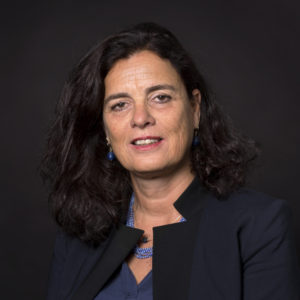
Hofman, Prof. dr. Corinne
Corinne L. Hofman is PI of the CaribTRAILS project at the KITLV, which receives funding from the NWO Spinoza prize awarded to her in 2014. She is Professor of Caribbean Archaeology at the Faculty of Archaeology, Leiden University. From 2013 to 2019, Hofman was the CPI of the ERC-Synergy project NEXUS1492
Hofman studied archaeology at the Vrije Universiteit in Brussels and at Leiden University, before obtaining her doctorate in Caribbean Archaeology from Leiden University in 1993. Over the past three decades, Hofman has conducted archaeological research on many of the Caribbean islands, very often in the context of salvage projects related to natural or human impacts. Her research and publications are highly multi-disciplinary and major themes of interest center around Indigenous archaeology, knowledge practices, mobility and exchange, colonial contact, inter-cultural dynamics, settlement archaeology, artefact analyses, provenance studies and climate change. Her projects are designed to contribute to the preservation, and valorization of Indigenous heritage in the culturally and geopolitically diverse islandscape of the Caribbean.
Hofman has obtained prestigious research grants, amongst which an ASPASIA-grant (2003-2008) from the Netherlands Organisation for Scientific Research (NWO), a NWO VIDI-grant (2004-2009), and a NWO VICI-grant (2008-2013). Hofman was also awarded a NWO open competition grant titled Island Networks: modeling inter-community social relationships in the Lesser Antilles across the historical divide (2013-2018) and a Humanities in the European Research Area (HERA) grant titled CARIB: Caribbean encounters in a New World Setting (2013-2016). In 2013, Hofman was awarded the European Research Council (ERC) Synergy-grant for a project titled Nexus 1492: New World Encounters in a Globalising World (2013-2019). Since 2021 she is PI of Work Package 1 (Resilient past communities and traditional knowledge practices from a long term perspective) in the NWO-Island(er)s at the Helm project chaired by Dr. Francio Guadeloupe (2021-2026).
Hofman was on the board of the Faculty of Archaeology, Leiden University, as vice-Dean from 2007 to 2012 and as Dean between 2013 and 2018. In 2013, Hofman was awarded the KNAW-Merian prize for ‘Women in Science’, the NWO Spinoza prize in 2014, and the Distinguished Lorentz Fellowship in 2018. She is a member of the Royal Holland Society of Sciences and Humanities (KHMW) since 2013, the Royal Dutch Academy of Sciences (KNAW) since 2015, the Academia Europaea since 2016, and Corresponding Fellow of the British Academy since 2018. From 2013 and 2018, she was a member of the Netherlands National Commision for UNESCO. In 2022 Hofman was one of the champions for the 10th edition of the EuroScience Open Forum (ESOF). She is one of the editors of the Brill Series The early Americas and member of the editorial board of the Journal of Archaeological Method and Theory, Antiquity Journal and Táboüi.
Selected Publications
With Martin J.A., Boomert A., Manem S.Y.P., Jacobson K.F. & Hoogland M.L.P., ‘Reimagining creolization: The deep history of cultural interactions in the Windward Islands, Lesser Antilles, through the lens of material culture’, Latin American Antiquity 33-2: 279–296, 2022.
With Stancioff C.E., Richards A., Auguiste I.N., Sutherland A. & Hoogland M.L.P., ‘Resilient Caribbean communities: A long-term perspective on sustainability and social adaptability to natural hazards in the Lesser Antilles’, Sustainability 13-17: 9807, 2021.
With Valcárcel Rojas R. & Ulloa Hung J., ‘Colonization, transformations, and indigenous cultural persistence in the Caribbean’, in: Beaule C.D. & Douglas J.G. (eds.), The global Spanish empire: Five hundred years of place making and pluralism. Tucson: The University of Arizona Press, 2020.
With F.W.M. Keehnen (eds.), Indigenous encounters and material transformations in the early colonial Americas. Leiden: Brill, 2019.
With A.T. Antczak (eds.), Early settlers of the insular Caribbean: Dearchaizing the archaic. Leiden: Sidestone Press, 2019.
With W.F. Keegan (eds.), The Caribbean before Columbus. Oxford: Oxford University Press, 2017.
With W.F. Keegan & R. Rodríguez Ramos (eds.), Oxford Handbook of Caribbean Archaeology. Oxford/NY: Oxford University Press, 2013.




